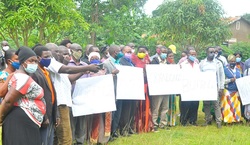Witness Radio | 7 December 2020
Land grabs victims in Uganda form a movement to fight for their rights
Kalangala/Ssese – Uganda; Communities affected by land grabbing from different parts of Uganda have formed a movement to fight for food sovereignty while pushing back on land grabs by multinational agribusiness companies and individual investors.
The formation of the movement came after a 3-day long meeting and drawn participants from several districts including Mukono, Mubende, Kayunga, Kiryandongo, and Kalangala among others.
The first-ever space for land grabs’ victims organized by Witness Radio -Uganda, Alliance for Food Sovereignty in Africa (AFSA), GRAIN, and World Rainforest Movement (WRM) provided opportunities for peer to peer meeting, share experiences and testimonies as well as learning best practices while on the various injustices that been meted out on them by companies and individuals under the guise of investment.
Some of the victims included those that were forcibly evicted by New Forest Company and Kaweeri Coffee all in Mubende, and they have been in the struggle to get their land back since 2001.
Others were representatives of over 35,000 people that were displaced by speculators and commercial land grabbers in the Kiryandongo district to plant maize, sugarcane, and coffee as well as those from Kalangala, Bumanje, and Ssese islands whose land was grabbed by BIDCO/Wilmar company limited.
In their statement released over the weekend at the end of the meeting, the group is demanding the immediate release of all those arrested on trumped-up charges related to land grabs and an audit into companies and individuals behind the land grabs.
“We need an audit of commercial agricultural investments and individual investors in relation to human rights violations, land grabbing, and environmental abuse. There should also be an end to abuses on all people including women and children”. A statement reads in part.
The group also wants the government to revive the use of district land tribunals and courts to avoid delays in determining cases related to land.
“The perpetrators might be different, but we have noticed that the injustices and tactics are similar. These so-called investors come purposely to grab our land but disguise as development partners and that is why we are learning from our colleagues”. Said the head of the movement, Stella Akiteng.
She added that commercial plantations by multinational companies come with land degradation, poor waste management, loss of land, compromise on food sovereignty, health implications, poor drainage systems, effects on air pollution, and a negative impact on the local economy.
The newly formed movement will join a global alliance, which currently has more than ten (10) members including Nigeria and Cameroon.
The communities believe that the movement will provide a common voice to challenging the injustices meted out on them through such land grabs.














